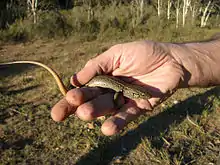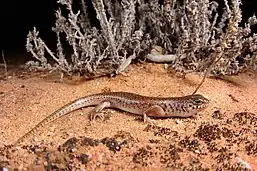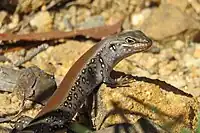Liopholis
Liopholis is a genus of skinks, lizards in the family Scincidae.[2] Species of the genus are found in the Australian region. They were previously placed in the genus Egernia.[1]
| Liopholis | |
|---|---|
 | |
| White's skink (Liopholis whitii) | |
| Scientific classification | |
| Domain: | Eukaryota |
| Kingdom: | Animalia |
| Phylum: | Chordata |
| Class: | Reptilia |
| Order: | Squamata |
| Family: | Scincidae |
| Subfamily: | Egerniinae |
| Genus: | Liopholis Fitzinger, 1843 |
| Type species | |
| Lygosoma moniligera A.M.C. Duméril & Bibron, 1839 | |
| Species | |
|
12 species (see text) | |
| Synonyms[1] | |
|
Flamoscincus | |
Description
Liopholis are smallish to largish-sized skinks. They may attain an adult snout-vent length (SVL) of 75–200 mm (3.0–7.9 in), with a bulky angular body. They have 34–52 rows of midbody scales; dorsal scales are usually smooth. The nasal scale has no postnarial groove; the subocular scale row is incomplete. The eyes are relatively large, and the eyelids usually have conspicuous cream-coloured margins.[1]
Species
There are 12 recognized species:[2]
| Image | Scientific Name | Common Name | Distribution |
|---|---|---|---|
| Liopholis guthega Donnellan, Hutchinson, Dempsey & Osborne, 2002 | Snowy Mountains skink, guthega skink, alpine egernia | southeastern Australia. | |
 | Liopholis inornata (Rosén, 1905) | desert egernia, unadorned desert-skink, "desert skink" | central Western Australia, most of inland South Australia, southern Northern Territory, south-west Queensland, western New South Wales and a small part of north-west Victoria |
| Liopholis kintorei (Stirling & Zietz, 1893) | Great Desert skink | Northern Territory and Western Australia. | |
| Liopholis margaretae (Storr, 1968) | Centralian Ranges rock-skink, Flinder's Ranges rock-skink | central Australia. | |
| Liopholis modesta (Storr, 1968) | Eastern Ranges rock-skink | eastern Australia | |
| Liopholis montana Donnellan, Hutchinson, Dempsey & Osborne, 2002 | montane rock-skink, mountain egernia, "mountain skink" | southeastern Australia | |
| Liopholis multiscutata (Mitchell & Behrndt, 1949) | bull skink, southern sand-skink, heath skink | southern Australia | |
| Liopholis personata (Storr, 1968) | southern Australia | ||
| Liopholis pulchra (F. Werner, 1910) | southwestern rock-skink, spectacled rock skink, Jurien Bay rock-skink | southwestern Australia | |
| Liopholis slateri (Storr, 1968) | Slater's desert skink, Centralian Floodplains desert-skink, Slater's egernia, Slater's skink | Northern Territory and Southern Australia in central Australia | |
| Liopholis striata (Sternfeld, 1919) | night skink, nocturnal desert-skink, striated egernia | western Australia | |
 | Liopholis whitii (Lacépède, 1804) | White's skink, White's rock-skink | south-eastern Australia, including Tasmania and many Bass Strait islands |
Nota bene: A binomial authority in parentheses indicates that the species was originally described in a genus other than Liopholis.
References
- Gardner, Michael G.; Hugall, Andrew F.; Donnellan, Stephen C.; Hutchinson, Mark N.; Foster, Ralph (2008). "Molecular systematics of social skinks: phylogeny and taxonomy of the Egernia group (Reptilia: Scincidae)". Zoological Journal of the Linnean Society. 154 (4): 781–794. doi:10.1111/j.1096-3642.2008.00422.x.
- Liopholis at the Reptarium.cz Reptile Database. Accessed 20 September 2018.
Further reading
- Fitzinger L (1843). Systema Reptilium, Fasciculus Primus, Amblyglossae. Vienna: Braumüller & Seidel. 106 pp. + indices. (Liopholis, new genus, p. 22). (in Latin).